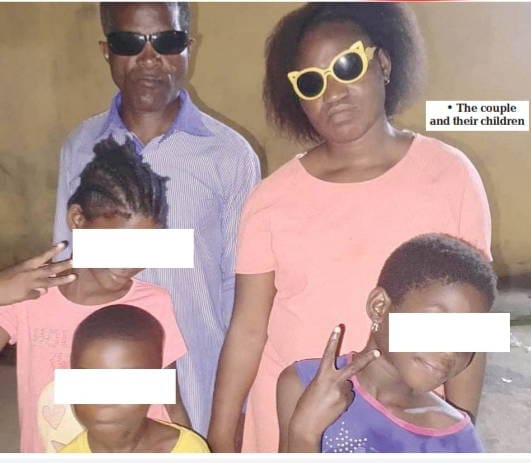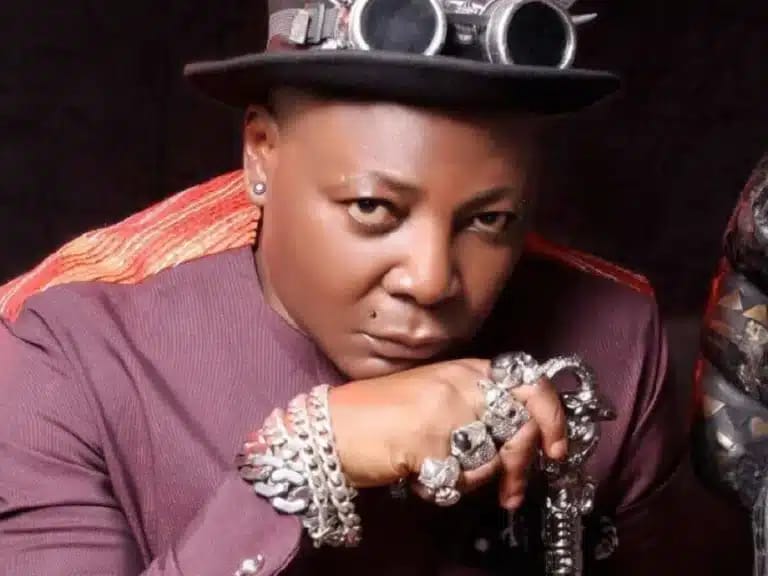In the bustling city of Lagos, where survival often depends on resilience and resourcefulness, the story of Stanley Theophilus and his wife, Victoria Uchechukwu Ekesi, stands out as a moving tale of perseverance, hardship, and hope. Both blind, the couple live in a modest two-room apartment in Ikotun with their three children, relying on faith and determination while facing the reality of joblessness despite their academic achievements.
Stanley, 47, and Victoria, 28, were not born blind. For both, measles robbed them of sight in their childhood years. Stanley’s blindness came after an untreated eye condition worsened following a failed follow-up to surgery and an accident in the village. Victoria, on the other hand, lost her sight after a doctor mistakenly operated on her good eye instead of the weaker one when she was a child. The illness left them both navigating life in darkness, but neither allowed their disability to extinguish their ambitions.
Victoria, who endured the loss of her parents and grandmother at a young age, refused to let her circumstances define her. Supported by the Anglican Church, she completed her secondary school education and went on to earn two university degrees—one in Peace and Conflict Resolution from the National Open University of Nigeria and another in Mass Communication from the University of Lagos. She later served her National Youth Service Corps (NYSC) year at a school for the blind in Abuja. Despite her qualifications, she remains unemployed, submitting CVs to multiple companies without receiving a response.
Stanley’s early life was marked by hardship as well. Raised by his grandmother in Imo State before moving to Lagos, he attended a special school for the blind where he developed vocational skills such as playing the keyboard, drums, and working with cosmetics. His passion for music eventually became his primary source of income, though irregular and often undervalued. He recounted how churches sometimes paid outsiders large sums for music performances while disregarding his talent, despite his ability to sing and play instruments for hours without rest.
The couple’s love story began in 2013 in a classroom for the visually impaired in Isheri Olofin, Lagos, where they discovered a bond rooted in shared struggles and mutual understanding. Victoria described Stanley as a kind and gentle man who gave her a sense of safety unlike others she had encountered. Together, they built a family, raising three children who now guide them through the city. Their eldest daughter, just nine years old, often leads her father to programmes and events, while her siblings assist their mother with errands like going to the market.
Despite their strength, life for the couple has been defined by financial struggles. Victoria has tried small-scale production of insecticides to generate income but faces difficulties in marketing her products. Stanley supplements their livelihood through music but laments the lack of recognition and fair compensation for his skills. Their rent is due, and invitations to play at events have dwindled, leaving them with mounting uncertainty about their future.
Yet, both remain resolute in their refusal to beg. Stanley made a personal covenant never to resort to street begging, insisting that blindness should not mean helplessness. He pointed to examples of blind comedians, preachers, and professionals who have thrived despite their condition, expressing his belief that true tragedy lies not in blindness but in failing to use one’s other abilities.
What the couple seeks is not charity but opportunity. Stanley has released music in the past, including his 2019 track Your Grace, but without funding for promotion or video production, his work has gone largely unnoticed. He appealed passionately for support to secure a record label deal, stressing his versatility in different musical styles and languages. “Give me just one chance,” he said, his voice carrying both determination and desperation. “If I fail, drop me. But I won’t fail. I know what I carry. It’s in my bones, in my spirit, in every note I play. I just need someone to believe enough to let me show it.”
For Stanley and Victoria, the struggle is not only about providing for their children but also about proving that blindness is not a barrier to talent, education, or dignity. Their story underscores the larger challenge faced by many educated but unemployed Nigerians with disabilities, whose potential often goes untapped due to systemic neglect and societal prejudice.
As they continue to rely on their faith and resilience, the couple hopes their plea will reach those willing to extend opportunities, not handouts. To them, a single chance could transform their lives and ensure that their children, who now serve as their guiding light, can grow up in a home no longer defined by struggle but by the rewards of perseverance.





